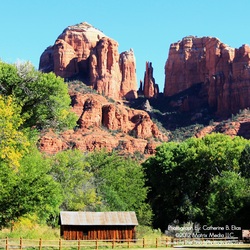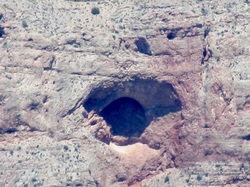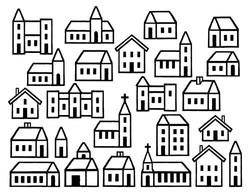Ahab told Jezebel all that Elijah had done, and how he had killed all the prophets with the sword. Then Jezebel sent a messenger to Elijah, saying, ‘So may the gods do to me, and more also, if I do not make your life like the life of one of them by this time tomorrow.’ Then he was afraid; he got up and fled for his life, and came to Beer-sheba, which belongs to Judah; he left his servant there. But he himself went a day’s journey into the wilderness, and came and sat down under a solitary broom tree. He asked that he might die: ‘It is enough; now, O Lord, take away my life, for I am no better than my ancestors.’ Then he lay down under the broom tree and fell asleep. Suddenly an angel touched him and said to him, ‘Get up and eat.’ He looked, and there at his head was a cake baked on hot stones, and a jar of water. He ate and drank, and lay down again. The angel of the Lord came a second time, touched him, and said, ‘Get up and eat, otherwise the journey will be too much for you.’ He got up, and ate and drank; then he went in the strength of that food for forty days and forty nights to Horeb the mount of God. At that place he came to a cave, and spent the night there.  Elijah has fled to a solitary place. God meets him there with one question... One diagnostic question: What are you doing here? As I read it, he answers with three bits of information. How he's been? I have been zealous. How the people are: they have forsaken the covenant, thrown down altars and killed your prophets. Then Elijah tells God why he's in the wilderness: they're going to kill me. God's diagnosis: Elijah is tired and hungry. God's treatment plan: A little nap under the tree and some cakes delivered by an angel. Check. Then God instructs Elijah to go to the mountain because God is about to pass by. Elijah complies with God's treatment plan. And sure enough God passes by. And then it begins again.  God's diagnostic question remains the same: What are you doing here? Elijah's answer remains the same. God's diagnosis is not the same this time. And God's treatment plan is also not the same. God's diagnosis: Elijah needs colleagues. God's treatment plan: God offers help, tangible help with the calling of a new king and a new prophet. God gives Elijah colleagues. From a pastoral care point of view, this text is fairly instructive. God asks a simple question and listens for and inside Elijah's answer. The treatment plan is comprehensive. God's diagnosis is complex. Elijah's needs are met on a physical, emotional and spiritual level... and relational level. While I've "yadda yadda yadda'd" over the whole wind, earthquake and sheer silence section, I'm fully intrigued by God's care of this solitary leader. And so for us preachers who often find ourselves running away to a wilderness place (or wishing we could run away to a solitary place), how might we answer God's diagnostic question, What are you doing here? Elijah gives us a little help in answer this question. He answered by saying how had he been, how the people are and why he was in the wilderness. So... How have you been? What's going on with the people? And why are you in the wilderness? I wonder what God's diagnosis and treatment plan might be for us if we were to have an honest conversation like this with God.
1 Comment
1 Kings 5:1-4 - Now King Hiram of Tyre sent his servants to Solomon, when he heard that they had anointed him king in place of his father; for Hiram had always been a friend to David. Solomon sent word to Hiram, saying, ‘You know that my father David could not build a house for the name of the Lord his God because of the warfare with which his enemies surrounded him, until the Lord put them under the soles of his feet. But now the Lord my God has given me rest on every side; there is neither adversary nor misfortune.  I've moved a lot. My husband says I am part gypsy. I like change. The parts of me that need to be settled are not attached to the homes in which I live. And so I'm fascinated by this scene in Israel. The people and sheep - so numerous that they could not count them - gathered to see God move into God's new home. "An exalted home, a place for God to dwell forever." This is the day in the life of Israel where they formed the first buildings and grounds committee. This is the season where the congregation entered the real estate business. Solomon was fulfilling a promise that he had most certainly heard his dad repeat time and time again. A promise that if we remember was in response to David wanting to build God a house. I can't help but wonder was it ever in God's plan, on God's agenda to get into the real estate business. In our world, this text opens up a conversation for us. Do we dare enter into it? In the Presbyterian world where I play, specifically in the northeast, our assets are wrapped up in our real estate. We own a lot of property. As we see our membership decline, our engagement in real estate keeps us from imagining being church in any other way than with a building. Our buildings, our real estate has enslaved us. Too cynical for this grand day in Israel's history? I can smell the BBQ and hear the children playing as they run around the outer court of the temple. I can sense the excitement of the people who were the architects and builders. I see the crowds arriving by foot with their children in one hand and their sacrifice in the other. I see the delight in their eyes as they imagine having truly arrived as a people. They have escaped Egypt and made it through generations of judges. They have claimed their land, their space, their lot in life. And now, they are a "real" people. A settled people. A worshiping people. And their God - Their God has staked claim on this earth. God is dwelling right here, with them, on the land where they are dwelling. And so here comes God, in the ark, up the street and the people are yelling and waving their hands. Singing and clapping. And God is moved up the steps, past the crowds, through the freshly painted columns. Then God is deposited in a place where no one can see God. The curtain is drawn. Hmmm... The Lord said to Samuel, ‘How long will you grieve over Saul? I have rejected him from being king over Israel. Fill your horn with oil and set out; I will send you to Jesse the Bethlehemite, for I have provided for myself a king among his sons.’  The people have been led by Moses. They have been led by judges. They have been led by prophets like Eli and Samuel. And they have been led by a king - King Saul. Samuel's first choice. God's first choice. In one of the oddest stories of the Bible, Saul becomes king - a story that includes runaway donkeys and a special, sacred cooked thigh bone, and Saul hiding amidst the luggage. From the beginning of Israel's journey as a monarchy, they are clearly making it up as they go. Reluctance, confusion, mistrust. God has decided to try again - God is going to take a second chance. The text begins this week with God talking Samuel into trying again. Stop mourning Saul. Let's move on. Let's cut our losses. Let's go with a second choice. Let's give ourselves a second chance. Seeing himself as a sort of traitor, Samuel sets out in an act of sedition. He is overthrowing the current human government at the instruction of the true leader, God. We see Samuel wrestling with the dual allegiance that a monarchy creates. Samuel has allegiance to King Saul but God has asked for mutiny.  Samuel sets out with his heifer and his anointing oil. He is preparing himself to choose a better king than his first choice. This time he will choose a strong leader, a formidable, God-fearing, trustworthy man. But God instructs Samuel to ignore outward appearances. God tells Samuel that God looks at the heart. How is Samuel supposed to do that? He doesn't know Jesse. He doesn't know Jesse's sons. And if he does choose one, he's about to ask them to join his revolution. Why would they do that? What if they won't? What if the revolution doesn't work? What if the second choice isn't any better than the first choice? Second chances come with second guessing. The psalter that has been combined with this story seems to provide a broader context for second chances. I want to linger with this prayer for forgiveness. My favorite version of the psalm is this one below by Charlie Peacock. It's haunting. The song yearns for God's unfailing love, God's great compassion, God's forgiveness, cleansing and mercy. I, like Samuel often need to be talked into second chances. I cling to the first choice trying desperately to make it right, to overlook the disasters around me, to give grace in the moment rather than cut my losses and start over. But when David faced the need for a second chance, this psalm doesn't show him clinging to his mistaken path. He yearns for a second chance. And he asks for a second chance from a God who also takes second chances.
Now the boy Samuel was ministering to the Lord under Eli. The word of the Lord was rare in those days; visions were not widespread. At that time Eli, whose eyesight had begun to grow dim so that he could not see, was lying down in his room; the lamp of God had not yet gone out, and Samuel was lying down in the temple of the Lord, where the ark of God was. Then the Lord called, “Samuel! Samuel!” and he said, “Here I am!” and ran to Eli, and said, “Here I am, for you called me.” But he said, “I did not call; lie down again.” So he went and lay down. The Lord called again, “Samuel!” Samuel got up and went to Eli, and said, “Here I am, for you called me.” But he said, “I did not call, my son; lie down again.” Now Samuel did not yet know the Lord, and the word of the Lord had not yet been revealed to him. The Lord called Samuel again, a third time. And he got up and went to Eli, and said, “Here I am, for you called me.” Then Eli perceived that the Lord was calling the boy. Therefore Eli said to Samuel, “Go, lie down; and if he calls you, you shall say, ‘Speak, Lord, for your servant is listening.’” So Samuel went and lay down in his place. Now the Lord came and stood there, calling as before, “Samuel! Samuel!” And Samuel said, “Speak, for your servant is listening.”  Elizabeth Barrett Browning said, "Earth's crammed with heaven, And every common bush afire with God; But only he who sees, takes off his shoes - The rest sit round it and pluck blackberries." "Now Samuel did not yet know the Lord and the word of the Lord had not been revealed to him." I don't remember when I did not yet know the Lord. My first church experience was at Stelton Baptist Church, an American Baptist church in central NJ. I was a child of the nursery and then the preschool. I learned the books of the Bible before I was 5. I can still remember Uncle Charlie teaching me how to say Habakkuk. Uncle Charlie wasn't a blood uncle, he was one of the many adults in the church who introduced me to the Lord. Isn't that what Eli is doing? He's introducing Samuel to the Lord. He's nurturing him into a relationship with the living, speaking, loving, judging God. Samuel, meet God. God, well you know Samuel already. You two talk. There's a scene from the TV show the Newsroom where they are arguing about political candidates saying that God told them to do something, run for office, vote a certain way, etc... I'd show the video here but it takes down a tangent (a funny one but a tangent nonetheless.) The questions I've got is "what does God's voice sound like?" Not for Samuel, not for Moses, not for Abraham but if I'm honest for us.
 Yesterday was the first preschool chapel at my church. I play the guitar for them. This allows me to get to know the parents a little bit and be available to people who do not attend my congregation. We always say a prayer at the end of chapel. I say a prayer and they repeat after me. But yesterday was our first chapel and part of the lesson was learning what it means "to pray." Very simply, the preschool director who was teaching the lesson said, "when we pray we are talking to God. Sometimes we say thank you for things; sometimes we ask God for things." When I read this text about the young Samuel hearing God's voice for the first time, I wonder had he also learned that definition of prayer when he was a 3 or 4 year old. "Samuel, when we pray we talk to God." It's not surprising then when he heard a voice talking back to him, he didn't consider it to be God. Because after all, when we pray, we talk to God. When do we learn that God talks back? How do we teach how God talks back? Father Thomas Keating says, "Silence is God's first language, everything else is a poor translation. In order to hear that language, we must learn to be still and to rest in God." Samuel offers us a beautiful, childlike picture of that kind of "talking to God" when he said, "Speak Lord, for your servant is listening." Samuel was taught to listen to the Lord. What does that mean? What exactly are we listening for? And how do we know it is God's voice? For the Presbyterian that I've become, wisdom is found in the collective of God's people. Discernment comes when many listeners engage prayerfully listening together.This text causes me to stop, find silence and dare to utter the same words as Samuel, "Speak Lord, for your servant is listening." |
Search this blog for a specific text or story:
I am grateful for
|

This work is licensed under a Creative Commons Attribution-NonCommercial-ShareAlike 3.0 Unported License.
